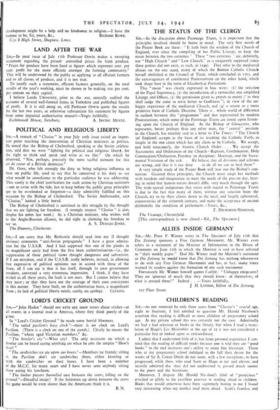Sm,—In the discussion about Patronage Trusts, it is important that
the principles involved should be borne in mind. The very first words of the Prayer Book are these: "It bath been the wisdom of the Church of England, ever since the compiling of het Public Liturgy, to keep the mean between the two extremes. These " two extremes ' are, definitely, not " High Church " and " Low Church." as is trequently supposed (since these parties did not exist, as such, in 1549). They refer to the mediaeval abuses on the one nand, many of which the Roman Catholic Churck herself abolished at the Council of Trent, which concluded in 1563, and the extravagances of continental Protestantism on the other hand, which took shape here in the form of Elizabethan Puritanism.
This " mean " was clearly expressed in four ways: (1) the rejection of the Papal Supremacy, (2) the introduction of a vernacular and simplified Liturgy and Offices, (3) the permission given to priests to marry (" as they shall judge the same to serve better to Godliness "), in view of the un- happy experience of the mediaeval Church, and (4) a return to a more primitive form of Catholic Doctrine. There is whole world of difference in outlook between this " programme" and that represented by modern Protestantism, which some of the Patronage Trusts are intent upon fasten- ing upon the Church of England. As the Bishop of Gloucester, who represents, better perhaps than any other man, the " central " position in the Church, has recently said in a letter to The Times: "The Church (of England) accepts as the basis of its teaching the Catholic Faith, as taught in the one creed which has any claim to be Catholic. We accept, and hold tenaciously, the historic Church Order. . . . We accept the Sacraments and Ordinances of the Church—Baptism, Confirmation, Holy Communion,•Ordination, Penance (or disciphne). Marriage, and the Sacra-
mental Visitation of the sick. . believe that all divisions and schisms are wrong, and that it 's our duty . to do all we can to heal them."
A very simple study of the Prayer Book will bear out the Bishop's con- tention. Granted these principles, the Church must adapt her methods with freedom and imagination to meet the needs of the presznt day, bear- ing in mind that human nature doesn't diffe, very much through the ages. The wide-spread indignauon that exists with regard to Patronage Trusts is due to the fact that many of them, without any sanction from the Church, try to tie their clients down to the local, and largely ephemeral, controversies of the sixteenth century, and make the acceptance of ancient shibboleths the condition of preferment.—Yours, &c., [This correspondence is now closed.—Ed., The Spectator.]


























 Previous page
Previous page